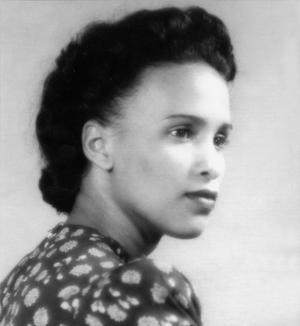Suzanne Césaire

Suzanne Césaire (1915–1966) was a prominent French Caribbean writer, poet, and intellectual from Martinique, known for her contributions to the Negritude movement alongside her husband, the poet Aimé Césaire. A passionate advocate for the cultural and political liberation of the Caribbean, Suzanne’s work focused on the intersection of race, colonialism, and identity. She was also deeply involved in the intellectual and artistic circles of the time, participating in the development of the journal Tropiques which was central to the Negritude movement. Suzanne Césaire’s writings often explored the impact of colonialism on the psyche of colonized peoples and championed the need for a revaluation of Black identity and heritage. Suzanne’s intellectual legacy continues to resonate in the fields of postcolonial studies, feminism, and Caribbean literature.

“Poetry and Knowledge” (1941)
Info: In this essay, Suzanne Césaire reflects on the role of poetry in both expressing and shaping knowledge. She critiques colonialism for imposing a limited, Eurocentric view of the world and argues that poetry, especially the works of Black poets, has the potential to transcend this by offering a more profound and authentic understanding of the self and the world. She sees poetry as a powerful tool for self-affirmation, resisting the colonial narratives that have oppressed Caribbean people.

"The Indispensable Revolution" (1942)
Info: Suzanne Césaire discusses the need for a cultural revolution in the Caribbean, one that goes beyond the political and addresses the internalized racism and colonial mentality among the colonized. She argues that the true revolution must encompass a radical rethinking of identity, a complete break from colonial ideologies, and an embrace of Afro-Caribbean heritage. This essay explores how cultural revolution is intertwined with social and political change, urging Caribbean people to reclaim their own cultural agency.

"The Bigamous Marriage" (1942)
Info: In this essay, Suzanne critiques the colonial system's "bigamous marriage" between France and its Caribbean colonies. She metaphorically describes this relationship as inherently dishonest and exploitative, with the Caribbean colonies forced to live under a system that simultaneously subjugates them while claiming them as integral parts of the French empire. Suzanne calls for an honest confrontation with this colonial marriage, advocating for a break from the unequal and oppressive ties between France and its colonies.

"Tropical Art" (1943)
Info: Suzanne Césaire critiques the colonial gaze that reduces Caribbean art and culture to mere "tropical exotica" for European consumption. She calls for a more genuine and authentic understanding of Caribbean art that reflects the lived experience, history, and struggles of the Caribbean people. In this essay, Suzanne stresses the importance of reclaiming artistic expression as a form of resistance, using it to reassert a true, self-defined Caribbean identity that defies colonial stereotypes.